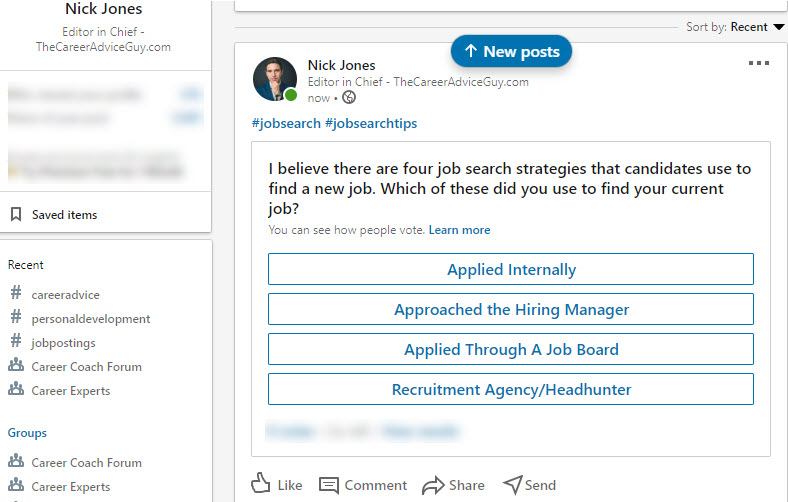Looking for a new job in 2020 is very different proposition than it was in the past. 20 years ago, if you were looking for a job in finance, you could pick up a financial magazine in your local shop and look at the job section in the back, where there would be a selection of roles. If after reading the job advert you were interested in the role, you could send your CV directly to the company and it is likely you would be given a face-to-face interview with the hiring manager.
Today the internet means that everyone across the country can view and apply for the same jobs that you’re applying to. Today, it is not uncommon to have a thousand applications to a job advert. Research shows that 133 graduates applied for each graduate position advertised, while on average, 89 candidates applied to mid-level roles in the UK. Over the years I have heard stories of candidates applying to a thousand jobs adverts and not receiving a single reply.
How Do Companies Hire Candidates?
The way that companies hire talent is also continually changing. Ten years ago, companies would focus on finding talent using recruitment companies, job boards, and their network. Today there is less prominence towards recruitment companies and job boards, and more focus towards company brands and personal networking.
Due to the internet, companies are receiving thousands of CV’s from potential candidates across the world. It’s now not only the experience on your CV that counts, but also knowing how to write a CV that takes into account keywords to help to beat the company’s applicant tracking system.
In this section, we are going to explore job search strategies to help you find your dream job. Rather than simply telling you my job search strategies, I’ve devised a simple survey that will show us how companies find talent. Once we understand how companies find their talent, we can look at the best ways for you to find your next position.
The 2020 Survey

The 2020 Survey was both sent out to over 60,000 candidates from my email list, but also placed as a poll on LinkedIn. The survey asked one simple question, how did you find your current job?
The results were terrific and provided us with a great insight into how companies find their talent and more importantly, how we need to approach our job search in the future. The results showed that;
- 42% – Found their new job internally
- 27% – Approached the hiring manager
- 10% – Applied through a Job Board
- 15% – Were approached via a recruitment company
- 6% – Other Methods
What Does This Mean For Your Job Search
If we start from the top, you can see that companies would most of all like to promote internally or hire from within.
42% Internal
The survey showed that 42% of all hires were internal. We will talk more about this later, however getting into a company in the wrong job, is much better than not being in that company at all.
Hiring mangers want to try before they buy. They want to see your work, your personality, and whether you’re going to fit into the team, before they hire you into a permanent role. The easiest way to do this, hire someone on a temporary contract, do see what they’re like to work with, and either hire into a full-time role, or don’t renew the contract.
27% – Approach Hiring Manager
Second on the survey with 27% was approaching the hiring manager directly. My favorite job search strategy is to reach out to the hiring manager directly. Very simply, you build a list of potential hiring managers, find their email address, and email each with a introductory email and your CV. The benefit is your CV reaches the hiring manager directly, and they can consider you for both existing positions, but also non-active positions that are not urgent, and not actively being hired at present.
The way to take this a step further is through referrals. Referrals mean that someone in the business has noticed the company is hiring right now and has suggested a candidate for a specific role. For a candidate looking for a new job, this is probably the best way of finding a new job, as your job application already comes with a reference that will be trusted.
10% – Job Boards
The survey shows that 10% of candidates found their new job from a job board. Ten years ago, job boards would have been the best way of finding a new job. Across the world, there are some massive companies such as Monster or Indeed which have thousands of jobs on their websites at any one time.
The problem with job boards, everyone has access to them, and its very easy to apply for a job. I can easily apply for 100 jobs today. Candidates often read a job advert, think they would like a go and applying to it.
The result, job adverts receive thousands of applications each day, and it takes a robust applicant tracking systems to sort through those candidates with the vast being rejected. Unless your’s is exactly what I’m looking for, my applicant tracking system will reject your CV, no matter whether you have the right experience not.
15% – Recruitment Agencies
The final job search strategy is recruitment agencies. My survey found 15% of candidates used recruitment agencies. What’s important, you approach the right recruitment consultant, and right recruitment agency, in the right way.
As an example, I have a friend who recruits for compliance professionals in a bank. He is a specialist in his field. Unless you have banking compliance experience, there is no point in sending him your CV. That doesn’t stop hundreds of people each month sending him their CV, and then complaining because they cannot help.
6% – Others
6% is towards other job strategies, with many out of the box strategies being included. We’ve got some great strategies to talk about.
The Only Way To Look For A Job In 2020

42% – Internal Candidates
Given 42% of all new hires were found using internal candidates, your first point of call needs to be getting into a company where the hiring managers can see your work and more importantly be impressed by it.
If you can get the vote of confidence from a hiring manager, you have an internal reference that will improve your chances of finding a permanent position. If you’re smart, you can use this reference in other ways outside the company simply by researching their network.
This means looking at the temp market, contracting or even taking a job that you don’t want in the long term, but can prove yourself and move into a permanent role within the group.
In this section, we’re looking specifically at ways you find a new job by being the internal candidate that the hiring manager chooses.
How Contracting Got Me My Dream Job
We have looked at Temping in the past as a great way to find out if a career is right for you without committing, however contracting can also be an excellent way for you to join a company of your dreams.
Contract work is where you join a company on a short-term contract, usually for a month. The idea is that while you’re in the company, you look out for positions that could be suitable.
Temping or Contract work allows hiring managers to view your personality, work ethic, and knowledge first-hand, with very little commitment from the company. If a company offers a candidate a temporary job for one month and the candidate does not fit the position, at worst, the company has only lost one month’s salary.
For a company, it means they can take risks on who they hire and are more likely to hire you for a role they’re not 100% sure you’re going to be suitable for but would like to give it a go. If it does not work out, they can quickly move onto other candidates.
For candidates looking for a new job, this can be a great way into a company while allowing you to prove your skills, knowledge, and experience to the hiring manager. If you perform well, it’s likely you will be the only candidate they think about for the role.
Temping and Contracting also allows you to quickly meet and network with a whole new selection of hiring managers. This means that if an internal job is not available within the company, you now have a whole selection of hiring managers that could give you a reference and may be able to put you in contact with someone they know who is hiring.”
How I Got Two Job Offers From One Month Long Contract
Think about this scenario – You take a contract job for a month. You work hard, prove your knowledge and experience and overall impress the hiring manager.
You now have two chances for a full-time job;
- Option One – The hiring manager might be impressed with your standard of work and offer a full-time role in their department,
- Option Two – They might be able to put you in contact with someone within their network, with a decent reference. I am often sent candidates by hiring managers that I trust and know well. Their reference attached to the candidate means it’s a straightforward process of getting that candidate an interview in another company. The same applies to you.
If you have a personal reference, you can be sure you’re going to be interviewed.
The Step Down Or Step-Sideways
If your key aim is to get into a company and grow your career, over the long-term, contracting is a great option as shown above, however a second way could be to take position that is a step-down or a step-sideways.
If you accept a position that you’ve experienced in the past, you know you’re going to be successful and can easily impress the hiring manager and build a successful career over the longer term.
Remember, hiring managers want to promote from within their team as a first choice. Whilst it might take some time to get your career moving forwards, it’s a better option than being out of work for a long time.
One Point
There is really no point in applying for positions that you could do in your sleep. Taking a step side-ways or a slight step down is one thing, but if you’re currently Head of Sales and you’re applying to junior sales roles, you’re unlikely to be successful with your application.
The minute a hiring manager views your CV, the first question that will be asked is why you’re looking at such as junior role and secondly how long you’ll stay.
Both are very difficult questions to answer on a CV. You might be good at the role, but we all know at the first opportunity, you’ll be off to take a better job, leaving me, the hiring manager back at square one – looking for candidates.
Hiring managers will not take this risk, but they will on the other hand take a candidate whose already had experience of this role, hoping they will be able to offer that candidate something larger in the future as the department grows.
27% – Approached The Hiring Manager
You can apply to hundreds of job adverts, speak to recruiters and send as many LinkedIn message as you want. Ultimately if you’re CV does not reach the hiring manager, you’re never going to be interviewed, and you’ll never be in the running for the position.
The way around this, you send it directly to the hiring manager and get them to review it for any positions available in their team. The best thing about this job search, you’re sending it in relation to open roles, but you can also be considered for closed roles that either the hiring manager plans to hire in the future, or roles that are not active, but the hiring manager will hire for if they can ind the right candidate.
The method for this job search strategy is as follows;
- Step One – Build a list of potential hiring managers that are relevant to both your career, and position level. The keyword here is relevance.
- Step Two – Find their professional email addresses. Don’t send your CV to their personal email as its not professional. Personally I will not respond to emails sent to my private email address.
- Step Three – Email each hiring manager your CV, and an introductory email outlining why you’re the right candidate who they need to meet.
This is a difficult process and one that very few candidates can be bothered to try. Those that do realise this is the best job search strategy, and the only strategy they need to find a new job.
Referrals/Networking
In my opinion, a referral is the most important part of any successful job search. What a referral is telling the hiring manager, is that you’re good at your job and someone that they need to speak to.
Referrals are part of everyday life – Do you need a new car, laptop, camera or even holiday? What’s the first thing you do when you decide that you want to go on holiday? In my case, it’s choose a country and head onto the Internet to check out the hotel reviews.
I want to know what other people think of the location and hotel. Did they have a nice experience? Would they return? What’s there to do? After reading all the reviews, I then decide if this is the holiday for me, or should I think of somewhere else to go.
Finding a candidate for a role is no different. Hiring managers want a perfect candidate, and after looking at a selection of CV, they want to narrow this down to a few select candidates that they will interview personally. This is where referrals are key. If you have a referral, you’ll skip straight to the front of the interview queue.
In this section, we’re looking at how to find and use that referral to be successful in your job search. Remember, networking is a massive part of finding that referral, and we spend most of this section looking at online and offline networking.
How To Find A Referral
The best referral is always going to be from a person the hiring manager knows well and ultimately trusts their opinion. The hard part of your job search is finding this person.
Above we have already discussed one way of finding a good referral, by contracting. This allows the hiring manager to view your work and can lead to recommendations.
We can use this exact process with other hiring managers that we’ve worked with in the past. Obviously if you have had a terrible working experience then it’s probably not a good idea to ask them for a reference, however they will also be build their networks and can help you with introductions.
How To Use LinkedIn To Find A Referral
We talk a lot about LinkedIn across this website as it’s one of the best places to network, search for referrals and source information that will help you with your job search.
As with any referral based job search, we’re trying to find someone who will give us a good reference , however by using LinkedIn, we can see who everyone is connected with and make those introductions possible.
If you can think outside the box, LinkedIn provides plenty of other opportunities to network and gain the valuable referral. Check out the post below where we look at ways to use LinkedIn to network yourself a new job.
LinkedIn – The Direct Reach Out Approach
LinkedIn is my favorite networking tool across the internet today. It allows you to search for potential hiring managers within our sector and add then as a connection.
Personally I would prefer to send my CV directly to the hiring manager using the method above, however the hit rate is not 100%, therefore I would use this method in conjunction with the above.
The Plan
Search Linkedin for potential hiring managers, and add them as a connection with a short message outlining why you want to connect. If you try and connect with 500 hiring managers, probably only 50% will accept your connect, but this is still a large number of potential positions.
It’s most important that when you try and connect with hiring managers, you add a small note for each application to include their name, why you want to connect and your name.
For me, something like. “Hi Tom, I am currently looking for a new position and given the relevance of my profile to you and your team, I would like to connect to see if we have any common ground. Please add me. Thank You. Nick”
Personally I would not connect with you without a message, however if you have written my name and a short note to why you want to connect, I will connect with you.
If the hiring manager connects with you, it’s very easy to send them your tailored CV and follow up with a phone a call.
10% Job Boards
I don’t think job boards should be a major focus of any job search, that said, there is always a place for them in your job search. Over the last few years, I have met candidates that have applied to thousands of jobs and never received a single reply. What worries me the most, often it’s not their CV that’s the problem. It’s the fact that each job advert gets thousands of replies and there is no way a recruiter will look at them all.
“Relevance” is the keyword when we’re talking about job boards. Recruiters will use an applicant tracking system and search for very specific keywords within your CV. In this section, we’re looking at job boards and how to beat them to make sure your CV is successful, and you’re the candidate that is chosen for interviews.
Before you apply to a job via a job advert, think about your CV and how it’s written. The majority of companies across the world will use some form of applicant tracking systems (ATS) to sort through the thousands of CV’s they receive each week automatically.
This means that you’re CV might not even be looked at by a recruiter or hiring manager, and is simply reviewed by the ATS portal and graded to it’s relevancy to the job search criteria. If you’ve not written it correctly, and have not focused on your relevant keywords, your CV could simply be given a low relevancy score, and an automatic email will be sent to say that you’ve not been successful.
Relevant Job Boards
Whilst you can easily apply to hundreds of job adverts through online job boards and not receive a single reply, you can optimise your time spent applying to job adverts through relevant job boards.
Relevance can be in two forms, it’s either a niche job board that your experience directly fits “OR” it’s an industry job board where your industry knowledge will substantially improve your chances of being successful.
Examples
- http://www.simplysalesjobs.co.uk – If your looking for a sales job in the UK then check out SimpleSalesJobs.co.uk. They only have sales jobs, and therefore if you’re an experience sales professional, this is the type of job board that you should be focusing your time on.
- https://www.rigzone.com – specialises in Oil and Gas jobs across the world across a range of disciplines from Finance and Sales to Operations and Engineers. If you’ve got experience in O&G, then this is the type of job board you should be focusing your time on. Hiring managers will like that you’ve already got experience in the industry and your relevancy score on any applicant tracking system will be high.
15% Recruitment Companies
Recruitment companies still have their place in your job search, however, you need to realise a recruiter is working for their client and not for you. Unless you have something the recruiter actively wants, honestly the recruiter does not care whether you exist or not.
Typically, a company will use an external recruitment agency to find candidates that are in short supply or when they cannot find a specific profile themselves. Whilst this is a small percentage, it still represents many thousands of hires each year across the world.
The key point here, you need to find if you want a recruiter to find you a new role. This does not mean simply sending your CV to your local recruiter and thinking the job is done.
In this section, we’re looking at recruitment companies. Which you should be looking at, which you should avoid and most importantly, how to make sure that if a recruiter is looking for a profile like yours, they find you first.
6% Outside The Box
Searching for a career is often a time-consuming process, but one that you need to think outside the box a little to get the right result. Any job application process that is easy, will receive thousands of candidate application. Most are simply just testing their luck with little or no chance of actually being successful.
If you put in some work and find the difficult, more time-consuming job search strategies, it’s more than likely that most other candidates will be put off, and there will be a much lower number of applications and more chance that your CV will be read.
Below is every idea I could think to help with your job search.
Social Media
Facebook and Twitter are key social media platforms that we all use to keep in touch with friends, however, social media also have access to billions of people across the world. There is a good chance, you’re next hiring manager has a profile on Facebook, Google+ or Twitter. It doesn’t take much to get access to their profile and use social media in your next job search.
The most important platforms that you should be using are twitter.com, Facebook.com, and LinkedIn.com. While there are many others, these are the main platforms that recruiters and hiring managers are using.
- Facebook – Most people assume that Facebook can be used only for your out of work network, however you would be surprised to know that over the last few years, Facebook is gradually increasing its presence in the job market. Facebook, not only allow you to job groups that are specifically aimed at a specific sector or industry, but also allows you to directly contact hiring managers through the website.
- LinkedIN – We are talking about LinkedIn.com again and another way that you can use LinkedIn to find a job. LinkedIn allows you to join groups that are specifically aimed towards your profile and career. You can use these groups to network with hiring managers and recruiters within your sector and have the ability to network directly with hiring managers.
- Twitter – Twitter.com allows you to sign up to companies twitter profiles and view any announcements that they make. If you sign up for a few hundred companies that are using twitter.com, any jobs that are posted on their twitter account meaning that any relevant jobs to your profile, you can apply to quickly.
Final Thoughts
Ultimately, finding a new job is about getting your CV in front of the hiring manager and making sure they decide that you’re the right person for the role.
You can have the best experience, the greatest CV and cover letter in the world, but at the end of the day, if the hiring manager does not look at your CV, you have no chance of getting a job.
If you think finding a job new is just applying to a few jobs on a job board, unless you’re extremely lucky, there’s a good chance you will never get anywhere.
Nick Jones
Latest posts by Nick Jones (see all)
- What Job Should I Do? It Depends on Whether You’re An Introvert Or An Extrovert - November 17, 2021
- Ten Ways to Unplug and Recharge During The Holiday Season - November 3, 2021
- 10 Jobs for Teenagers to Earn Extra Money - October 13, 2021






